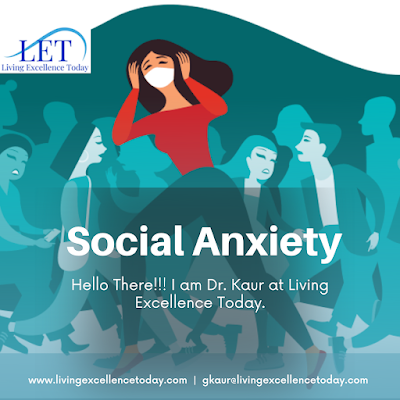Social Anxiety Disorder is a type of Anxiety Disorder that causes extreme panic to people attending any social gatherings. People with this mental health issue hesitate to speak in public, meet new people, and attend social gatherings. They feel afraid of being judged or scrutinized by others. Sometimes, people know that their fear is irrational, but they feel helpless to address that cause.
However, Social anxiety is different from shyness. Shyness occurs occasionally and does not disrupt the subject’s life. On the contrary, social anxiety is persistent and debilitating, affecting an individual’s professional and personal abilities.
After learning what is Social Anxiety, now it is time to have a look at its causes:
Causes of Social Anxiety Disorder
The exact reason behind Social Anxiety is unknown yet. However, some studies claim that people experience social phobia due to environmental and genetic factors. The negative effect of a person’s environment can be of following types:
● Bullying
● Family issues
● Sexual abuse
If we consider physical abnormalities, then serotonin imbalance contributes to this condition. Serotonin is a chemical messenger that regulates the mood of an individual. Sometimes, an overactive amygdala (a structure in the brain that regulates response, feelings, and anxious thoughts) also causes anxiety disorders.
How To Address Social Anxiety?
People facing social anxiety have trouble making friends, and also struggle in maintaining good relationships. Though one might face some kind of social anxiety at a particular point in their lives, it is entirely unnatural for an individual to get this feeling regularly for a long period of time.
There are some symptoms that indicate social anxiety. These involve:
● Not feeling good, simultaneously not feeling happy too
● Low level of mindfulness
To address social anxiety, people can follow these tips:
1. Stop Seeking Sense of Purpose: Everyone’s purpose springs forth from their uniqueness. It is not something that floats around the earth independently, similar to a cloud, waiting for you to find that. People need to understand that they are unique; they have their own story, in which they are the lead character.
2. Keep a Journal: This is similar to embracing yourself. Keeping a journal can help you address your thoughts and emotions. Just writing everything down can calm down your mind. Your feelings at any particular moment define the path joining you with your authentic self. Try to follow a constructive approach by embracing your thoughts. Always remember you have to avoid being judgemental while addressing your thoughts.
3. Try Therapy: Good therapists holds the key to the Best Manifestation Methods and therapies. These methods and therapies help people to identify their true selves and appreciate the same. The identification of individuals with their real identities helps in overcoming the issue of social anxiety.
Always remember you do not have to lead a life that you do not wish to lead. Your life values a lot, and you deserve all the goodness in your life. For this purpose, all you need is to have a meaning and purpose in your life. If you cannot find that very purpose and meaning, then do not hesitate to consult with Dr. Gurpreet Kaur. Dr. Kaur is a Certified Clinical Mental Health Counselor. You can connect with her through Living Excellence Today’s official website.
Also See:- How Does Stress Affect Our Everyday Life?

Comments
Post a Comment